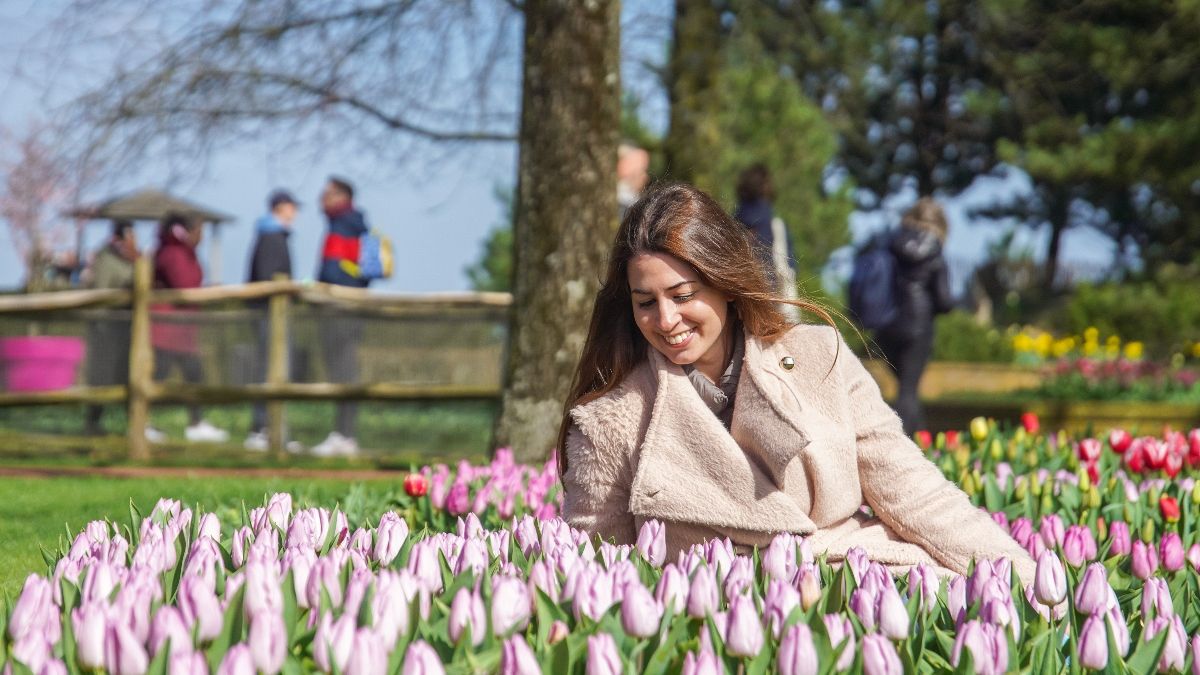If springtime flowers fill you with joy, there is one place in Europe which is an absolute must: Keukenhof.
Close to the Dutch capital of Amsterdam, you’ll find vast gardens filled with a staggering seven million - mostly tulip - bulbs.
The Lisse-based floral exhibition is set on 32 hectares (or 79 acres) of land and each bulb is painstakingly planted by one of Keukenhof’s 40 gardeners.
2024 marks the 75th anniversary of the glorious garden. Here’s everything you need to know about it - and how to make a floral visit a reality, when it officially opens on 21 March.
A brief history of Keukenhof garden
The doors to Keukenhof - also known as the Garden of Europe - opened on 21 March 1949.
Established that year by a consortium of bulb growers and flower exporters, it was initially set up to showcase products and support the Netherlands’ export industry.
The following year, the garden opened to the public and was an immediate success, welcoming 200,000 visitors in its first season.
Situated in the municipality of Lisse, just south-west of Amsterdam, it’s now known as one of the world's largest flower gardens.
It dates back to 1638, when Adriaen Maertensz Block, captain and governor of the Dutch East India Company, bought the land and built a large manor house called Castle Keukenhof.
In 1857, then-owners Baron and Baroness Van Pallandt tasked landscape architect Jan David Zocher and his son Louis Paul Zocher - both designers of Amsterdam's Vondelpark - to restructure the park and grounds around the building.
Those designs, in typical English style, still form the basis of the modern day Keukenhof gardens.
Here’s what to expect during a visit to Keukenhof
While the gardens are no less than a cultural phenomenon, especially for the huge amount of tulips on display, you won’t just see these beautiful spring flowers.
Around 600 growers and trading companies supply their best flowers, shrubs and trees for the show, which runs for around eight weeks a year.
Expect to catch glimpses of the likes of roses and orchids as well as 800 different varieties of tulips and some of the best cherry blossoms in the whole country.
Different species are given their own spaces to showcase their unique charms.
Among the many themed pavilions, you’ll come across the Beatrix - named after the former queen of the Netherlands - where you’ll find orchids and anthurium. The nearby Oranje Nassau pavilion showcases the best roses, chrysanthemums and daffodils.
There does seem to be something for everyone, even for the smallest visitors.
Aside from millions of flowers, there’s a children’s maze as well as a scavenger hunt, petting zoo and a playground themed around Miffy, the Dutch rabbit icon.
You can also delve into the history of Keukenhof, with a visit to the park’s famous windmill, which was built in Groningen in 1892 and formerly used as a pumping mill.
Also on show are authentic 16th and 17th-century tulip varieties which serve to illustrate the development of more than 400 years of bulb growing in the Netherlands.
Dotted around the gardens, you’ll also stumble across around 100 individual sculptures showcasing a wide variety of artistic styles.
The entire venue is an artist’s dream, especially if you’re into photography. The flowers - in every tone imaginable - pop up every year across social media, drawing people in with their veritable riot of colour.
How to make the most of your visit to Keukenhof
Since its foundation, Keukenhof has unsurprisingly been exceptionally popular as a destination.
However, due to its vast size, Keukenhof doesn’t feel overwhelmingly busy. Nevertheless, we’d advise a little planning ahead before your tiptoe through the tulips.
If you’re travelling to the Netherlands purely to visit Keukenhof, we would recommend staying in nearby Lisse and catching a local bus.
Starting in Amsterdam? You’ll want to hop on the metro and get off at the Europaplein stop. From there, climb onboard the 852 bus - otherwise known as the Keukenhof Express. It runs up to ten times an hour and takes just over 30 minutes to reach the garden. You’ll need to take the 858 bus if you’re going straight to Keukenhof from Schiphol Airport; the journey takes half an hour and runs frequently.
No matter how long your trip is, it’s not a visit to the Netherlands with a boat or bicycle ride. Luckily, there are a variety of bicycle tours you can take around Keukenhof and if water is more your thing, you’re in luck.
Electrically powered boats cruise the channels between the bulb fields around Keukenhof, meaning you can take in the rainbow of flowers in a super relaxed way.
Keukenhof is open from 21 March to 12 May 2024.


